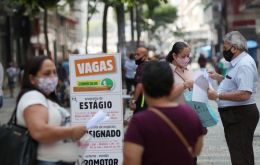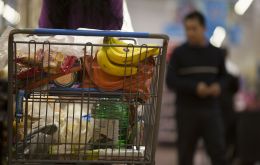MercoPress. South Atlantic News Agency
Economy
-
Thursday, November 17th 2022 - 19:09 UTC
Unemployment drops in Brazil

According to the Quarterly Continuous National Household Sample Survey (PNAD) released Thursday by Brazil's Institute of Geography and Statistics (IBGE), the unemployment rate in the third quarter of this year went down from 9.3% to 8.7% overall from the previous quarter, thanks to drops in six states: Paraná (-0.8 %), Minas Gerais (-0.9 %), Maranhão (-1.1%), Acre (-1.8%), Ceará (-1.8%) and Rondônia (-1.9%).
-
Thursday, November 17th 2022 - 18:51 UTC
Shares of Uruguayan unicorn plummet after rumors of fraud

Shares of the first and only Uruguayan unicorn dLocal, a company that debuted on Wall Street in June 2021 fell up to 43% this from $21 to $10 a piece Wednesday after rumors of fraud went public.
-
Thursday, November 17th 2022 - 10:00 UTC
UK's double shock, highest inflation in 41 years and a draconian Autumn budget

Chancellor of the Exchequer Jeremy Hunt will unveil this Thursday before Parliament his long-awaited Autumn budget statement, having anticipated to the UK population that “we will be asking everyone for sacrifices.”
-
Thursday, November 17th 2022 - 10:00 UTC
Considerable container freight rate decline from Asia to Eastern South America

The latest S&P Global Monday release on Platts Americas Container Freight shows that non-Asian export cargo bound for the East Coast of South America saw the greatest freight rate decline, dropping 51.9%, or US$ 2,700, throughout the week, to settle at US$ 2,500/FEU.
-
Thursday, November 17th 2022 - 09:58 UTC
Moody's: Argentina remains high-risk for 2023

The credit-risk rating agency Moody's insisted this week that Argentina's main concern for the foreseeable future was its domestic debt in local pesos while the country keeps swerving through its financial mercuriality in an electoral year.
-
Wednesday, November 16th 2022 - 10:18 UTC
Indec says Argentina's inflation for October reached 6.3%

Argentina's inflation reached 6.3% in October for an 88% interannual result, according to the latest report from the National Institute of Statistics and Census (Indec). According to current projections, it may reach 100% by the end of the year.
-
Tuesday, November 15th 2022 - 10:01 UTC
UK, US, EU discussing continuation of Black Sea Grain Deal with Russia

UK Foreign Secretary, High Representative of the European Union, and US Secretary of State gave a statement on global food security and Russia sanctions. The statement follows on Russia's complaints that it saw no progress on easing its exports of fertilizers and grain – parts of the Black Sea grain deal that Moscow views as fundamental to extending the initiative beyond next week.
-
Tuesday, November 15th 2022 - 09:30 UTC
Uruguayan Former Vice President Danilo Astori resigns from his Senate seat

Former Economy Minister Danilo Astori informed the Frente Amplio (Broad Front) party on Monday that he will resign his seat in the Senate on Tuesday.
-
Tuesday, November 15th 2022 - 09:00 UTC
World's largest meat producer slowdown begins to reflect in Mercosur cattle prices

Brazil’s JBS SA, the world’s largest meat producer reported last Friday that quarterly profit plunged 47.1%, with results still beating analysts’ estimates as higher revenues helped offset shrinking margins in its U.S. beef division.
-
Monday, November 14th 2022 - 19:56 UTC
Argentine Labor Minister said inflation is not a priority but Qatar World Cup
![“One month is not going to make a big difference [...], the people deserve to see Messi champion”, pointed out Kelly Olmos, head of the Ministry of Labor.](/data/cache/noticias/91337/260x165/olmos.jpeg)
Only six days before the beginning of the World Cup, which has Argentina as the great favorite, the Minister of Labor, Employment and Social Security of that country, Kelly Olmos, did not hide her enthusiasm for the World Cup in Qatar and said: “Then we continue working on inflation, but first let Argentina win”.
